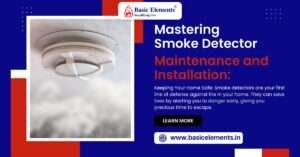Understanding the importance of Fire Safety Essential Measures Explained and safeguarding individuals and properties. Fire safety measures play a vital role in minimizing risks and preserving lives, assets, and the environment. By adopting effective fire prevention strategies like installing smoke alarms, ensuring proper maintenance of electrical systems, practicing safe storage of flammable materials, and conducting routine fire drills, we can greatly decrease the chances of fires happening and lessen their potential consequences. It’s crucial to be proactive about fire safety to protect against devastating outcomes.
Key Safety Guidelines to Minimize Fire Risks in Homes and Workplaces
To minimize fire risks in homes and workplaces, it is important to follow key safety guidelines. Here are some tips to enhance fire safety.
1. Install smoke alarms: Ensure that smoke alarms are installed on every level of your home or workplace and test them regularly to ensure they are in working condition.
2. Create an evacuation plan: Develop a clear evacuation plan with designated escape routes and meeting points in case of a fire emergency.
3. Keep flammable materials away from heat sources: Store flammable materials such as paper, chemicals, or fabrics away from heat sources to reduce the risk of fire.
4. Maintain electrical systems: Regularly inspect electrical wiring, outlets, and appliances for any signs of damage or wear that could potentially lead to electrical fires.
5. Practice proper kitchen safety: Avoid leaving cooking unattended, keep flammable items away from the stove, and have a fire extinguisher handy in the kitchen.
6. Implement workplace fire safety measures: Train employees on proper fire safety protocols, conduct regular drills, and ensure that firefighting equipment is easily accessible. By following these guidelines and incorporating them into your daily routines at Fire Safety Essential Measures Explained you can significantly reduce the risk of fires occurring.
Remember that prevention is key when it comes to ensuring the safety of yourself and others around you.
Common Causes of Fires and How to Mitigate Them Through Precautionary Steps
Fires can be caused by a variety of factors, including electrical malfunctions, cooking mishaps, smoking in prohibited areas, heating equipment failures, and flammable materials.
To prevent fires at home or in the workplace, it’s essential to take precautionary steps such as:
1. Electrical Safety: Avoid overloading outlets, use appliances according to manufacturer instructions, and regularly inspect wiring for damage.
2. Cooking Safety: Never leave cooking unattended, keep flammable items away from heat sources, and have a fire extinguisher in the kitchen.
- Smoking Precautions: Smoke only in designated areas away from combustible materials and always properly extinguish cigarettes.
- Heating Equipment Maintenance: Have heating systems checked annually by professionals and keep flammable items away from heaters or furnaces.
- Proper Storage of Flammable Materials: Store flammable liquids in well-ventilated areas away from heat sources and use appropriate containers for storage. By following these precautionary steps and being mindful of potential fire hazards in your surroundings, you can significantly reduce the risk of accidental fires both at home and in the workplace. Remember that fire safety is everyone’s responsibility
The Role of Fire Safety Essential Measures Explained in Fire Prevention
Proper equipment and maintenance play a crucial role in fire prevention by ensuring readiness to combat fires effectively. Regular maintenance of fire extinguishers is essential to ensure they are in working condition when needed.
This includes checking pressure levels, inspecting for damage, and verifying the expiry date. Smoke detectors are vital for early detection of fires, providing occupants with valuable time to evacuate safely. Regular testing and battery replacements are necessary to ensure smoke detectors remain functional.
There are different types of fire extinguishers designed for specific classes of fires (e. g., A, B, C) such as water-based extinguishers for Class A fires involving common combustibles like wood or paper, or CO2 extinguishers suitable for electrical fires (Class C). It is important to have the appropriate type of fire extinguisher available based on the potential fire hazards in a particular setting.
Educating Individuals on Emergency Procedures and Evacuation Protocols During a Fire Incident
emergency response during fires, evacuation plan for fires, stay safe during a fire outbreak Educating individuals on emergency procedures and evacuation protocols during a fire incident is crucial for ensuring everyone’s safety.
Here are some key points to consider.
1. Emergency Response During Fires: In the event of a fire, it is important to remain calm and follow the established emergency procedures. This may include activating the nearest fire alarm, immediately notifying emergency services, and assisting others in evacuating the premises Fire Safety Essential Measures Explained .
- Evacuation Plan for Fires: Having a well-defined evacuation plan is essential. Make sure all individuals are familiar with escape routes, assembly points, and designated personnel responsible for leading evacuations.
- Stay Safe During a Fire Outbreak: When escaping a fire, remember to stay low to avoid smoke inhalation, feel doors before opening them (if hot do not open), and use stairwells instead of elevators. Additionally, never re-enter a burning building once you have evacuated Fire Safety Essential Measures Explained . By providing clear guidance on these aspects and conducting regular drills or training sessions, you can help ensure that individuals are well-prepared to respond effectively in case of a fire incident.
Conclusion: Prioritize Fire Safety Today to Safeguard Lives and Property Tomorrow
Fire safety is a critical aspect of protecting lives and property. By prioritizing fire safety measures today, we can significantly Fire Safety Essential Measures Explained reduce the risk of fire-related incidents in the future. It is essential to invest time and resources in fire prevention strategies Fire Safety Essential Measures Explained , such as installing smoke detectors, conducting regular fire drills, and ensuring proper maintenance of firefighting equipment.
Remember, proactive measures taken today can save lives and prevent devastating losses tomorrow. Let’s prioritize fire safety to safeguard our communities and ensure a safer environment for all.
For more information visit : Basic Elements
Follow Us over page : Instagram






